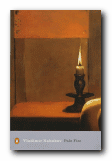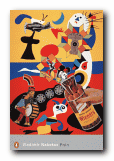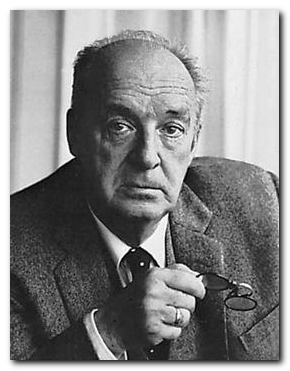tutorial, commentary, study resources, plot, and web links
Solus Rex is the second chapter of an unfinished novel Vladimir Nabokov wrote around 1939/40. (The first chapter was Ultima Thule.) The chapter was first published in Paris as Sovremennyya Zapiski in 1940, then in the collection A Russian Beauty and Other Stories in 1973. It represents a brief transition phase in Nabokov’s writing. When he arrived in Paris to begin the second phase of his exile (the first having been in Berlin) he had toyed initially with the idea of writing and publishing in French. But he quickly switched to his third language and from 1940/41 onwards wrote in English when he emigrated to America to begin the third phase of his exile.
In this story, as with its counterpart, it is difficult to escape the suspicion that Nabokov embellished the prose style of the text whilst engaged in the process of translation. The piece has many of the features of his late, Rococo mannerism – the persistent use of alliteration, a straining for obscure vocabulary, and a wilful, almost irritating wordplay. There is certainly a case to be made for a scholarly comparison of the original 1940 Russian text with its revised counterpart of thirty years later. That would make an interesting research project for someone in comparative literary studies.
Vladimir Nabokov
Solus Rex – critical commentary
There are some very faint traces of a connection between Solus Rex and its companion piece in the abandoned novel, the ‘story’ Ultima Thule. It is just possible that the events of Solus Rex, which take place in a country called Ultima Thule, are the story which Gosopin Sineusov, the protagonist of the first chapter, has been asked to illustrate. He is mentioned in the second chapter of the novel – although he is given a different Christian name and patronymic.
These connections are also pre-echoes of later fiction by Nabokov – particularly Pale Fire (1962), which also features the relationship between one level of fictionality and another, plus a similar fantasy-land called Zembla (‘a distant northern land’). The difference between them however is that Zembla is the invention of a madman, the novel’s narrator, Charles Kinbote. There is no comparable distancing device in the case of Ultima Thule.
It also has to be said that whereas Pale Fire is inventive and amusing, Solus Rex is amazingly below par by Nabokov’s usual standards. The literary style is annoyingly mannered, cluttered with over-long sentences stuffed with chained clauses, unnecessary parentheses, and contorted syntax. The events of the narrative are unfocussed, at a schoolboy level of invention, and not the slightest bit funny.
As in the case of Ultima Thule, Nabokov left behind his comments on the unfinished status of the ‘story’, and confirmation that the narrative had not been planned in detail before it was written.
Prince Adulf, whose physical aspect I imagined, for some reason, as resembling that of S.P. Diaghilev (1872-1929), remains one of my favourite characters in the private museum of stuffed people that every grateful writer has somewhere on the premises. I do not remember the details of poor Adulf’s death, except that he was despatched, in some horrible, clumsy manner, by Sien and his companions, exactly five years before the inauguration of the Egel bridge.
Solus Rex – study resources
![]() The Cambridge Companion to Nabokov – Amazon UK
The Cambridge Companion to Nabokov – Amazon UK
![]() Zembla – the official Vladimir Nabokov web site
Zembla – the official Vladimir Nabokov web site
![]() The Paris Review – 1967 interview, with jokes and put-downs
The Paris Review – 1967 interview, with jokes and put-downs
![]() First editions in English – Bob Nelson’s collection of photographs
First editions in English – Bob Nelson’s collection of photographs
![]() Vladimir Nabokov at Wikipedia – biographical notes, links
Vladimir Nabokov at Wikipedia – biographical notes, links
![]() Vladimir Nabokov at Mantex – tutorials, web links, study materials
Vladimir Nabokov at Mantex – tutorials, web links, study materials
![]() Brian Boyd, Vladimir Nabokov: The Russian Years, Princeton University Press, 1990.
Brian Boyd, Vladimir Nabokov: The Russian Years, Princeton University Press, 1990.
![]() Brian Boyd, Vladimir Nabokov: The American Years, Princeton University Press, 1991.
Brian Boyd, Vladimir Nabokov: The American Years, Princeton University Press, 1991.
![]() Laurie Clancy, The Novels of Vladimir Nabokov. New York: St. Martin’s Press, 1984.
Laurie Clancy, The Novels of Vladimir Nabokov. New York: St. Martin’s Press, 1984.
![]() Neil Cornwell, Vladimir Nabokov: Writers and their Work, Northcote House, 2008.
Neil Cornwell, Vladimir Nabokov: Writers and their Work, Northcote House, 2008.
![]() Jane Grayson, Vladimir Nabokov: An Illustrated Life, Overlook Press, 2005.
Jane Grayson, Vladimir Nabokov: An Illustrated Life, Overlook Press, 2005.
![]() Norman Page, Vladimir Nabokov: Critical Heritage, London: Routledge, 1997
Norman Page, Vladimir Nabokov: Critical Heritage, London: Routledge, 1997
![]() David Rampton, Vladimir Nabokov: A Critical Study of the Novels. New York: Cambridge University Press, 1984.
David Rampton, Vladimir Nabokov: A Critical Study of the Novels. New York: Cambridge University Press, 1984.
![]() Michael Wood, The Magician’s Doubts: Nabokov and the Risks of Fiction. Princeton, New Jersey: Princeton University Press, 1995.
Michael Wood, The Magician’s Doubts: Nabokov and the Risks of Fiction. Princeton, New Jersey: Princeton University Press, 1995.
Solus Rex – plot summary
Ultima Thule is a fairy tale island in the far north where it rains for 306 days in every year. It is ruled by a king called K who has taken over after the thirty-seven year reign of his predecessor and uncle, King Gafon. The narrative is a retrospective account of K’s earlier life centred on a bizarre power struggle between K and Prince Adulf (the heir apparent).
K has greasy hair, doesn’t wash, and wears foppish clothes. In his student days he meets Prince Adulf (also known derisively as Prince Fig) who is King Gafon’s degenerate son. Adulf believes that the history and traditions of this Nordic realm are founded on a hidden system of magic and sorcery. K agrees with him, but does not know why.
The two cousins go horse-riding, where the Prince seems to be planning something with K in mind. A few days later he invites K to a gathering of his reputedly self-indulgent friends. The company seems strangely heterogeneous but harmless enough. But when Adulf publicly performs a sex act on a pretty young man, K leaves in disgust.
When K reports the incident, his guardian the Count excuses the incident as ‘hygienic’ and passes K on to an economist called Gumm. In the two years that follow K learns that old King Gafon has excused the behaviour of his licentious son Adulf. K wonders why there isn’t public resentment, but the lower classes actually enjoy the spectacle of Adulf’s behaviour, which is widely reported in the press.
However, there is criticism and opposition to Prince Fig amongst the intelligentsia, but they are afraid to act because of a fear of the possible consequences. Eventually, a philosopher Dr Onze volunteers to spearhead a prosecution of Prince Fig. A trial reveals all sorts of pornographic iniquities committed by Fig, the details of which fill the newspapers and further enhance his reputation as a popular royal ‘rogue’. When the trial ends, the jury finds the prosecutor Dr Onze guilty and sentences him to eleven years hard labour. But then King Gafon pardons him.
Two years later K is still studying and is invited to a meeting of the opposition to the royal family. When he gets there he realises from the silences and the signals in the room that they are plotting to assassinate Fig. He feels uncomfortable and asks to leave.
![]() Vladimir Nabokov: The Collected Stories – Amazon UK
Vladimir Nabokov: The Collected Stories – Amazon UK
![]() Vladimir Nabokov: The Collected Stories – Amazon US
Vladimir Nabokov: The Collected Stories – Amazon US
Other work by Vladimir Nabokov
 Pale Fire is a very clever artistic joke. It’s a book in two parts – the first a long poem (quite readable) written by an American poet who we are encouraged to think of as someone like Robert Frost. The second half is a series of footnoted commentaries on the text written by his neighbour, friend, and editor. But as we read on the explanation begins to take over the poem itself, we begin to doubt the reliability – and ultimately the sanity – of the editor, and we end up suspended in a nether-world, half way between life and illusion. It’s a brilliantly funny parody of the scholarly ‘method’ – written around the same time that Nabokov was himself writing an extensive commentary to his translation of Pushkin’s Eugene Onegin.
Pale Fire is a very clever artistic joke. It’s a book in two parts – the first a long poem (quite readable) written by an American poet who we are encouraged to think of as someone like Robert Frost. The second half is a series of footnoted commentaries on the text written by his neighbour, friend, and editor. But as we read on the explanation begins to take over the poem itself, we begin to doubt the reliability – and ultimately the sanity – of the editor, and we end up suspended in a nether-world, half way between life and illusion. It’s a brilliantly funny parody of the scholarly ‘method’ – written around the same time that Nabokov was himself writing an extensive commentary to his translation of Pushkin’s Eugene Onegin.
![]() Buy the book at Amazon UK
Buy the book at Amazon UK
![]() Buy the book at Amazon US
Buy the book at Amazon US
 Pnin is one of his most popular short novels. It deals with the culture clash and catalogue of misunderstandings which occur when a Russian professor of literature arrives on an American university campus. Like many of Nabokov’s novels, the subject matter mirrors his life – but without ever descending into cheap autobiography. This is a witty and tender account of one form of naivete trying to come to terms with another. This particular novel has always been very popular with the general reading public – probably because it does not contain any of the dark and often gruesome humour that pervades much of Nabokov’s other work.
Pnin is one of his most popular short novels. It deals with the culture clash and catalogue of misunderstandings which occur when a Russian professor of literature arrives on an American university campus. Like many of Nabokov’s novels, the subject matter mirrors his life – but without ever descending into cheap autobiography. This is a witty and tender account of one form of naivete trying to come to terms with another. This particular novel has always been very popular with the general reading public – probably because it does not contain any of the dark and often gruesome humour that pervades much of Nabokov’s other work.
![]() Buy the book at Amazon UK
Buy the book at Amazon UK
![]() Buy the book at Amazon US
Buy the book at Amazon US
 Collected Stories Nabokov is also a master of the short story form, and like many writers he tried some of his literary experiments there first, before giving them wider reign in his novels. This collection of sixty-five complete stories is drawn from his entire working life. They range from the early meditations on love, loss, and memory, through to the later technical experiments, with unreliable story-tellers and the games of literary hide-and-seek. All of them are characterised by a stunning command of language, rich imagery, and a powerful lyrical inventiveness.
Collected Stories Nabokov is also a master of the short story form, and like many writers he tried some of his literary experiments there first, before giving them wider reign in his novels. This collection of sixty-five complete stories is drawn from his entire working life. They range from the early meditations on love, loss, and memory, through to the later technical experiments, with unreliable story-tellers and the games of literary hide-and-seek. All of them are characterised by a stunning command of language, rich imagery, and a powerful lyrical inventiveness.
![]() Buy the book at Amazon UK
Buy the book at Amazon UK
![]() Buy the book at Amazon US
Buy the book at Amazon US
© Roy Johnson 2014
More on Vladimir Nabokov
More on literary studies
Nabokov’s Complete Short Stories
